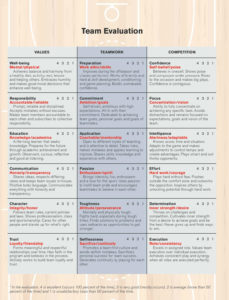A proven system for evaluating team performance and chemistry
I coached high school basketball for 18 years, and I always believed one of the biggest challenges was acquiring information to make good decisions. As any experienced leader knows, you need honest feedback from every stakeholder to make the decisions that ultimately make or break a season.
This is also one of the most rewarding parts of coaching, as every team includes different personalities, strengths and weaknesses. With this in mind, I created a framework that helps eliminate assumptions and speculation about a team so you can properly define and measure the components for team success.
Everyone reflects at the conclusion of a season. Nevertheless, in my experience, it’s more powerful to define expectations in the beginning, and follow by periodically reflecting with your team throughout the season. I certainly have been guilty of poor reflection. One year, at the conclusion of the season, we determined that our team lacked toughness. That was a failure on my part because I should have run toughness drills every day until we were physically and mentally prepared to compete at a high level.John Calipari redefined roles for his Kentucky Wildcats during the 2018 season. After winning the conference tournament and prior to the NCAA Tournament, he said his players didn’t know their roles midway through the year. He went back to the drawing board, assigning and reassigning roles for everyone. As a result, Kentucky began to roll. When Calipari made this observation, he didn’t say his star players had to redefine their roles; he said all players had to redefine their roles. This falls into the “execution” component of my team evaluation, as it describes how every role on the team has value. Great coaches value all 18 components of this evaluation, but the tool is simply designed to help organize those components so they can be easily defined, referenced and used for evaluation purposes when necessary.

Your team members are your experts, and they are very receptive to this evaluation. It gives all players a voice, and it reminds them about the important characteristics of teamwork. More importantly, players appreciate an evaluation process that values the things that make a successful team and empower their lives in the future. This helps every team member find a way to contribute to achieving team goals, because the evaluation is not about talent — it’s about teamwork.
Team evaluation
The team evaluation framework is designed to help coaches define, organize and measure the essential characteristics for team success. The 18 components that are divided into three domains:
- Values: Who you are, and what you’re becoming.
- Teamwork: What you’re doing to make your team successful.
- Competition: How you compete for the team.
Anyone and everyone in your program should complete the evaluation. Players can evaluate themselves, everyone can evaluate the team, players can evaluate leaders or leaders can evaluate players.
Coaches can use this before the season to help define expectations. They also can use it during the season to discover areas needing improvement, and at the end of a season as a tool for reflection.
Distribute the evaluation, rate each component and discuss the results. This establishes transparency, provides a framework for team success, identifies areas for improvement and creates benchmarks for growth. Most importantly, it gives all team members a voice.
Here’s the rating system:
- Excellent (4): 100 percent of the component occurs (considered a strength).
- Very good (3): Mostly occurs, but not entirely (make minor improvements).
- Average (2): More than 50 percent of component occurs (modifications are necessary).
- Unsatisfactory (1): Less than 50 percent of component occurs (restructuring is necessary).
Darren Barndt coached basketball for 18 years and is an administrator at Lake Forest High School in Illinois. He also is the founder of 847 Hoops, a free, nonprofit youth basketball camp in Chicago.









